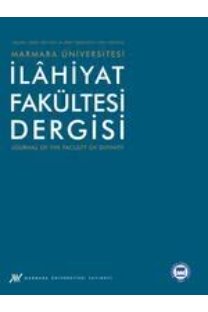Bir İsnad Tenkid Yöntemi Olarak Şardı Cerh-Tadiller ve Uygulamadaki Sonuçlan
If the biographical works regarding hadith narrators are glanced, it will be seen that the criticisms about many narrators have been conditioned in sorne ways such as period,place, teaeber (sheikh), student (rawi), subject, and terrns of narration, and whether having been narrated from original book or by heart. These criticisms are sametimes confinedto one or a few certain narrations of some narrators. This fact rnust be accepted understandable to a certain extent, for the humankinci is the elemental part of the isnad sistem,which constitutes the backbone of narrating. Since humankinci is naturally prone to change in the force of reason, and the narrators and their works may undergo sorne negativeeffects, it may be to! d that it is very hard or ev en irnpossible to find any narrator who has never been criticised although he has been we!l-qualifited in general. Therefore, it isnecessary to dassify these criticisms as unconditioned and conditioned, as well as they are dassified as unexplained (mujrnal) and explained (mufassar). Here, in this artide we try to study the conditioned criticisms and explain its results inpractice with examples.
Anahtar Kelimeler:
-
- ISSN: 1302-4973
- Başlangıç: 1963
- Yayıncı: Marmara Üniversitesi
Sayıdaki Diğer Makaleler
Nas-Olgu İlişkisi Açısından Mükerrer Nüzul
Yetişkinlerin Din Eğitim ve Öğretiminde Yardım Etme Bilinci
Arapça Öğretiminde Kaidelerle Edebi Metinler Arasındaki Irtibatın Onemi
Koreliler'in Din Değiştirme Motifleri
Mircea Eliade ve Türkler'in Dinlerini Araştırmadaki Önemi
Iréne MELIKOFF, İSMAİL TAŞPINAR
Bir İsnad Tenkid Yöntemi Olarak Şardı Cerh-Tadiller ve Uygulamadaki Sonuçlan
Sahih Kıraatıerin Arap Lehçeleriyle İlişkisi Üzerine
Osmanlı Dönemi Dini Kurtuluş Hareketlerinin Sosyolojisi
Günümüz Türk Toplumunda Dinsellik ve Kadın/Erkek Alteyhhtan Tutumlar
